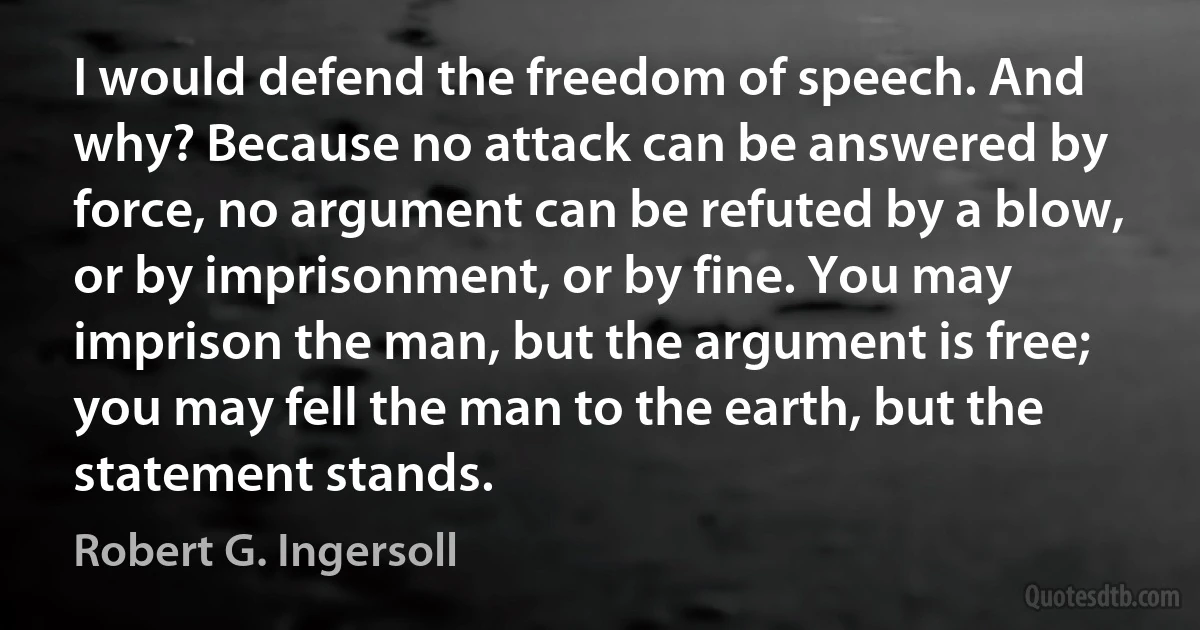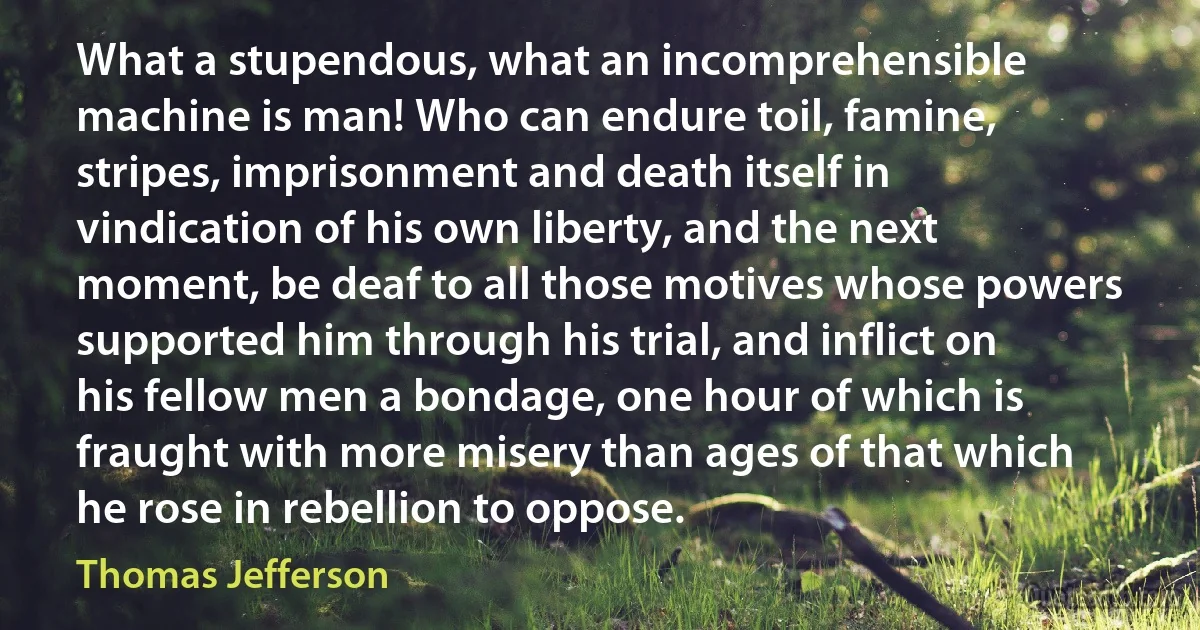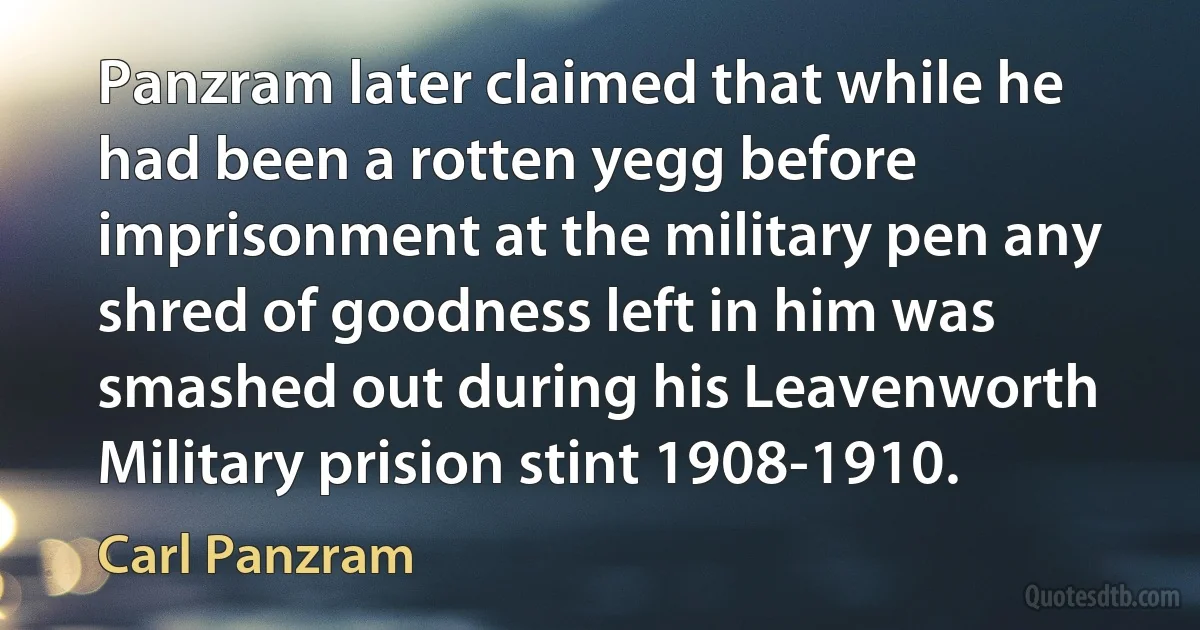Imprisonment Quotes - page 4
Last year, I filed Senate Bill Number 123 which penalizes bus drivers who commit criminal negligence in road mishaps with 20 years of imprisonment. The existing preventive policies require more teeth to achieve safety benefits. There is no guarantee to prevent all road accidents because of many factors including human, mechanical and environmental. But regulators like the LTO and the LTFRB carry the weight of preventing fatal accidents before these happen by strictly implementing the road safety fundamentals of all public utility vehicles. They have the responsibility to make all public transportation reasonably safe to drive and to travel on. These regulators must do their jobs. Stern measures need to be strictly implemented to ensure road safety. Conscious efforts from all sectors of government and the society should be at high level to avoid further loss of lives and damage to person and property. .

Francis Escudero
If a captive mind is unaware of being in prison, it is living in error. If it has recognized the fact, even for the tenth of a second, and then quickly forgotten it in order to avoid suffering, it is living in falsehood. Men of the most brilliant intelligence can be born, live and die in error and falsehood. In them, intelligence is neither a good, nor even an asset. The difference between more or less intelligent men is like the difference between criminals condemned to life imprisonment in smaller or larger cells. The intelligent man who is proud of his intelligence is like a condemned man who is proud of his large cell.

Simone Weil
But the governor's due execution 0f the laws consisted in retaining them a year or two in nominal imprisonment, when they were again set at liberty. Besides these, other foreigners have been murdered in New Mexico with equal impunity:-all which contrasts very strikingly with the manner our courts of justice have since dealt with those who killed Chavez (refer to p. 227-232), in 1843, on the Santa Fé road.

Josiah Gregg
I may become a poor man; I shall then be one among many. I may be exiled; I shall then regard myself as born in the place to which I shall be sent. They may put me in chains. What then? Am I free from bonds now? Behold this clogging burden of a body, to which nature has fettered me! "I shall die,” you say; you mean to say "I shall cease to run the risk of sickness; I shall cease to run the risk of imprisonment; I shall cease to run the risk of death.”.

Seneca
The tension between socially acceptable housewifery and creative ambition is certainly easy to find in Jackson's life, but it's rather harder to locate in her fiction. There's no question that, in her books, the house is a deeply ambiguous symbol-a place of warmth and security and also one of imprisonment and catastrophe. But the evil that lurks in Jackson's fair-seeming homes is not housework; it's other people-husbands, neighbors, mothers, hellbent on squashing and consuming those they profess to care for. And what keeps women inside these ghastly places is not societal pressure, or a patriarchal jailer, but the demon in their own minds. In this sense, Jackson's work is less an anticipation of second-wave feminism than a conversation with her female forebears in the gothic tradition. Her stories take the figure of the imprisoned "madwoman," as found in Charlotte Perkins Gilman's "The Yellow Wallpaper" or Charlotte Brontë's Jane Eyre, and make her the warder of her own jail.

Shirley Jackson
His political thought and concern found genesis in the socialist movement and ideology. Gandhi had been a deep influence on his ideas and personality. He was an erudite leader. He edited an important journal of the socialist movement, "Sangharsh", which was initially brought out by his political guru Acharya Narendra Dev. He edited another journal Young Indian in Hindi as well as in English. In the 19 months of his imprisonment during the Emergency he wrote a diary, published in two parts under the title "Meri Jail Diary".

Chandra Shekhar
It has been said that trees are imperfect men, and seem to bemoan their imprisonment rooted in the ground. But they never seem so to me. I never saw a discontented tree. They grip the ground as though they liked it, and though fast rooted they travel about as far as we do. They go wandering forth in all directions with every wind, going and coming like ourselves, traveling with us around the sun two million miles a day, and through space heaven knows how fast and far!

John Muir
The Magnitsky legislation is a pale substitute for justice. The penalty for torture, murder, wrongful imprisonment or grand corruption should not be canceled vacations in Miami Beach or on the Côte d'Azur but a real trial in a real court of law. One day, this will be possible in Russia. For now, it is not, and targeted sanctions from Western democracies serve as the only mechanism of accountability for corrupt Kremlin officials and human rights abusers. I will continue this work, as I know will many of my colleagues, regardless of any legislative novelties from the Russian government.

Vladimir Vladimirovich Kara-Murza
So far as the Labour party is concerned, The Open Society is almost entirely irrelevant. The Labour party from the Webbs to Attlee, though it believed in state-power as the antidote to inequality and competition and misunderstood Stalin's Russia, was neither intellectually Stalinist nor intellectually totalitarian. Its defects were then and are now more domestic and homely – the minority-mindedness and nonconformist conscience which Keynes discerned in Kingsley Martin, the editor of the New Statesman, the conviction of moral impregnability which makes it intolerant, evasive and querulous when policy conflicts with principle or goodwill stubs its toe on interests, and the sympathy for fads and crankcauses which it inherited from the Liberal party and continues to display in the imprisonment of General Pinochet, the campaign against fox hunting and the nonsense involved in Mr Cook's "ethical foreign policy".

Maurice Cowling
The recognition that love represents the highest morality was nowhere denied or contradicted, but this truth was so interwoven everywhere with all kinds of falsehoods which distorted it, that finally nothing of it remained but words. It was taught that this highest morality was only applicable to private life - for home use, as it were - but that in public life all forms of violence - such as imprisonment, executions, and wars - might be used for the protection of the majority against a minority of evildoers, though such means were diametrically opposed to any vestige of love.

Leo Tolstoy



